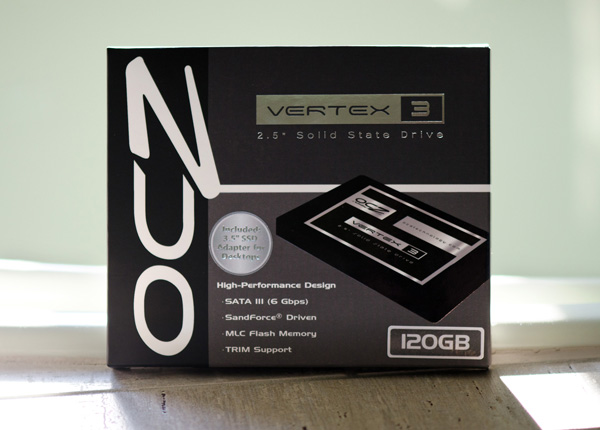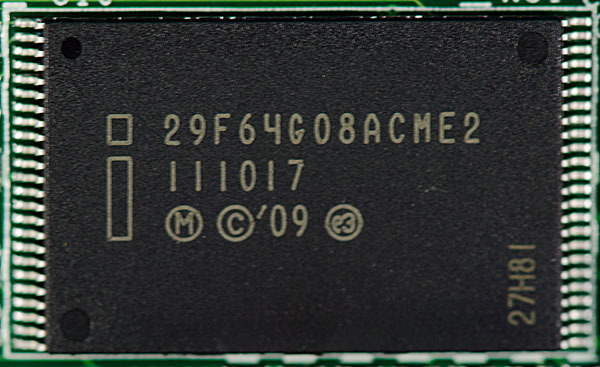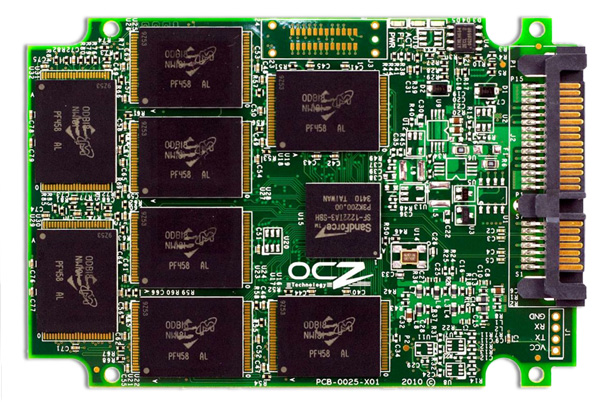The OCZ Vertex 3 Review (120GB)
by Anand Lal Shimpi on April 6, 2011 6:32 PM ESTSandForce was first to announce and preview its 2011 SSD controller technology. We first talked about the controller late last year, got a sneak peak at its performance this year at CES and then just a couple of months ago brought you a performance preview based on pre-production hardware and firmware from OCZ. Although the Vertex 3 shipment target was originally scheduled for March, thanks to a lot of testing and four new firmware revisions since I previewed the drive, the officially release got pushed back to April.
What I have in my hands is retail 120GB Vertex 3 with what OCZ is calling its final, production worthy client firmware. The Vertex 3 Pro has been pushed back a bit as the controller/firmware still have to make it through more testing and validation.
I'll get to the 120GB Vertex 3 and how its performance differs from the 240GB drive we previewed not too long ago, but first there are a few somewhat-related issues I have to get off my chest.
The Spectek Issue
Last month I wrote that OCZ had grown up after announcing the acquisition of Indilinx, a SSD controller manufacturer that was quite popular in 2009. The Indilinx deal has now officially closed and OCZ is the proud owner of the controller company for a relatively paltry $32M in OCZ stock.
The Indilinx acquisition doesn't mean much for OCZ today, however in the long run it should give OCZ at least a fighting chance at being a player in the SSD space. Keep in mind that OCZ is now fighting a battle on two fronts. Above OCZ in the chain are companies like Intel, Micron and Samsung. These are all companies with their own foundries and either produce the NAND that goes into their SSDs or the controllers as well. Below OCZ are companies like Corsair, G.Skill, Patriot and OWC. These are more of OCZ's traditional competitors, mostly acting as assembly houses or just rebadging OEM drives (Corsair is a recent exception as it has its own firmware/controller combination with the P3 series).
By acquiring Indilinx OCZ takes one more step up the ladder towards the Intel/Micron/Samsung group. Unfortunately at that level, there's a new problem: NAND supply.
NAND Flash is not unlike any other commodity. Its price is subject to variation based on a myriad of factors. If you control the fabs, then you generally have a good idea of what's coming. There's still a great deal of volatility even for a fab owner, process technologies are very difficult to roll out and there is always the risk of issues in manufacturing, but generally speaking you've got a better chance of supply and controlled costs if you're making the NAND. If you don't control the fabs, you're at their mercy. While buying Indilinx gave OCZ the ability to be independent of any controller maker if it wanted to, OCZ is still at the mercy of the NAND manufacturers.
Currently OCZ ships drives with NAND from four different companies: Intel, Micron, Spectek and Hynix. The Intel and Micron stuff is available in both 34nm and 25nm flavors, Spectek is strictly 34nm and Hynix is 32nm.
Each NAND supplier has its own list of parts with their own list of specifications. While they're generally comparable in terms of reliability and performance, there is some variance not just on the NAND side but how controllers interact with the aforementioned NAND.
Approximately 90% of what OCZ ships in the Vertex 2 and 3 is using Intel or Micron NAND. Those two tend to be the most interchangeable as they physically come from the same plant. Intel/Micron have also been on the forefront of driving new process technologies so it makes sense to ship as much of that stuff as you can given the promise of lower costs.
Last month OWC published a blog accusing OCZ of shipping inferior NAND on the Vertex 2. OWC requested a drive from OCZ and it was built using 34nm Spectek NAND. Spectek, for those of you who aren't familiar, is a subsidiary of Micron (much like Crucial is a subsidiary of Micron). IMFT manufactures the NAND, the Micron side of it takes and packages it - some of it is used or sold by Micron, some of it is "sold" to Crucial and some of it is "sold" to Spectek. Only Spectek adds its own branding to the NAND.
OWC published this photo of the NAND used in their Vertex 2 sample:
I don't know the cause of the bad blood between OWC and OCZ nor do I believe it's relevant. What I do know is the following:
The 34nm Spectek parts pictured above are rated at 3000 program/erase cycles. I've already established that 3000 cycles is more than enough for a desktop workload with a reasonably smart controller. Given the extremely low write amplification I've measured on SandForce drives, I don't believe 3000 cycles is an issue. It's also worth noting that 3000 cycles is at the lower end for what's industry standard for 25nm/34nm NAND. Micron branded parts are also rated at 3000 cycles, however I've heard that's a conservative rating.
If you order NAND from Spectek you'll know that the -AL on the part number is the highest grade that Spectek sells; it stands for "Full spec w/ tighter requirements". I don't know what Spectek's testing or validation methodology are but the NAND pictured above is the highest grade Spectek sells and it's rated at 3000 p/e cycles. This is the same quantity of information I know about Intel NAND and Micron NAND. It's quite possible that the Spectek branded stuff is somehow worse, I just don't have any information that shows me it is.
OCZ insists that there's no difference between the Spectek stuff and standard Micron 34nm NAND. Given that the NAND comes out of the same fab and carries the same p/e rating, the story is plausible. Unless OWC has done some specific testing on this NAND to show that it's unfit for use in an SSD, I'm going to call this myth busted.













153 Comments
View All Comments
jharmon - Monday, May 2, 2011 - link
It's been almost a month since an update in the SSD world from Anandtech. Are there any reviews on the near horizon? You said one might want to wait for a purchase until you got some of the lower capacity drives in to test to compare with the vertex 3.Thanks for all your hard work in analysis, Anand!
jharmon - Monday, May 2, 2011 - link
Maybe also address the issue with the hardware limitation from the Marvell controllers 91xx. If I understand it correctly, these will be be able to achieve the 500 MB/s. If that performance cannot be achieved, is the vertex 3 worth the premium?mrkimrkonja - Wednesday, May 4, 2011 - link
From these SSD articles I learned that TRIM is very important with SSD.I read somewhere that when you use SSD in RAID you lose TRIM support and some other things.
Is this true?
I now have 2 old ADATA SSD generation 1 in RAID0 they have 2x the performance comparing to a single drive bud they do not have TRIM anyway.
I already bought one VERTEX 2 60GB and thought buying anther one.
Always thought better more smaller disks in RAID than one big one.
If this is true I an thinking I would lose more over time without TRIM support than gain with RAID0.
Can you hal me with some info or first hand tests?
Foochey - Wednesday, May 4, 2011 - link
I would be very interested to see how the 480GB stacks up to these drives. Since these are parallel processing devices, you would think that the 480 would perform even better than the 240. Anand, any way you can get a 480 and test it? OCZ's specs look the same, so I'm guessing that they are using the smaller die chips or doing something with the way they write to the array. Any ideas? Price certainly makes the 480 out of the question for most of us, but I sure would be interested in its performance.jeffburg - Thursday, May 26, 2011 - link
OCZ Just launched the Max IOPS Version. Is that worth the extra $10? Whats the difference between the two?Palen - Thursday, June 2, 2011 - link
Thank you for another great article.In the conclusion of this article it's advised to wait for a couple of weeks to see how the vertex 3 120 GB goes againts the other 3rd generation 120GB SSD's. Is there any indication that Anandtech will be recieving / testing any of these drives in the near future?
Another thing is RAID: I've been doing some digging on SSD's, since I didn't know much about them untill last week. The general picture is starting to make sence now. Bigger is ussually faster (within certain parameters). However i'm getting conflicting information about RAID. According to some it's worth it, while others urge to stay away from RAID (no TRIM support, etc). It would be nice to have a well respected opinion in the mass of conflicting information. How would for instance 2x 60 GB SSD's do against a same type/brand 120 GB SSD? and how does the raidcontroller fit into this equation? On-board vs. professional solution?
My gut says "stay away from raid!" because the SSD's allready scale in performance depending on their storagesize. Next to that the strain that an onboard controller will put on your CPU. And paying for a professional raidcard just seems silly, with the range of SSD PCIe storage solutions. But than again, what do I know?
paul-p - Saturday, October 22, 2011 - link
After 6 months of waiting for OCZ and Sandforce to fix their firmware from freezes and BSOD's, I can finally say it is fixed. No more freezes, no more BSOD's, performance is what is expected. And just to make sure all of the other suggestions were 100% a waste of time, I updated the firmware and DID NOT DO anything else except reboot my machine and magically everything became stable. So, after all these months of OCZ and Sandforce blaming everything under the sun including:The CMOS battery, OROM's, Intel Drivers, Intel Chipsets, Windows, LPM, Hotswap, and god knows what else, it turns out that none of those issues had anything to do with the real problem, which was the firmware.
While I'm happy that this bug is finally fixed, Sandforce and OCZ have irrepairably damaged their reputation for a lot of users on this forum.
Here is a list of terrible business practices that OCZ and Sandforce have done over the last year...
OCZ did not stand behind their product when it was clearly malfunctioning is horrible.
OCZ did not allow refunds KNOWING that the product is defective is ridiculous.
OCZ nor Sandforce even acknowledged that this was a problem and steadfastly maintained it only affected less than 1% of users.
The fact that OCZ claims this bug affected 1% of users is ridiculous. We now know it affected 100% of the drives out there. Most users just aren't aware enough to know why their computer froze or blue screened.
OCZ made their users beta test the firmwares to save money on their own testing
OCZ did not have a solution but expected users to wipe drives, restore from backups, secure erase, and do a million other things in order to "tire out" the user into giving up.
OCZ deletes and moves threads in order to do "damage control and pr spin".
But the worst sin of all is the fact that it took almost a year to fix such a MAJOR bug.
I really hope that OCZ learns from this experience, because I'm certain that users will be wary of Sandforce and OCZ for some time. It's a shame, because now that the drive works, I actually like it.
paul-p - Saturday, October 22, 2011 - link
I just want to thank Anandtech for being the ONLY site out there there called out OCZ and Sandforce for having defective products. While every other hardware site out there were kissing OCZ and Sandforces butt and saying that the Vertex 3 SSD was the best thing since sliced bread, Anandtech actually was one of the only sites that actually acknowledged that there was a major bug with the sandforce controllers.I can't believe all the review sites out there were praising the Vertex 3 for almost a year when the drive had major BSOD and freezing issues. A review should be more than running a benchmark on the drive, but checking to see how the drive performs and making sure it is stable. In my eyes, every other review site showed me that they care more about the sponsors and advertising dollars than the users that visit their site. So, once again, thanks Anandtech for speaking the truth when others wouldn't.
danwat12345 - Sunday, November 13, 2011 - link
I think I'll keep my 80GB Intel X25-m G2 SSD. From your benchmarks it looks like the 120GB Vertex 3 over SATA 2 isn't that much better with random read operations than my trusty ole' 80GB Intel.I am curious if your Anandtech storagebench 2011 test were done on completely in-compressible data? The random read numbers of the Vertex 3 120GB SATA2 drive wasn't very impressive.
chainspell - Saturday, December 10, 2011 - link
you had me at page 4...tell Alex Mei (the CEO) he has my business, I just bought 2 of these on Newegg!